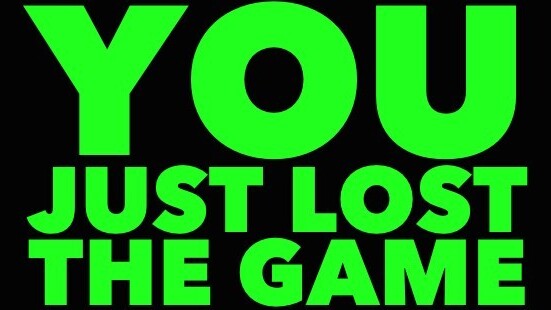
I went years without losing The Game. Then yesterday, it suddenly popped back into my head and that was it – I’d lost. Long before Rickrolling crawled out of the fetid swamps of 4Chan, The Game was out in the world, frustrating millions.
I just lost the game. But really, that's the least of my problems.
— ?Mic Wright ? (@brokenbottleboy) April 12, 2015
The central rule is simple – when you think about The Game, you’ve lost. When you lose, you’re obliged to declare it publicly, and once you’ve been introduced to the idea, it’s difficult to let it go.
The concept is an example of ironic processing, where attempts to avoid thinking of something make those very thoughts more prevalent.
Leo Tolstoy played “the white bear game” with his brother, in which he would have to “stand in a corner and not think of the white bear.” Russian winters are very long.
Dostoyevsky talks about the same game in his 1863 essay ‘Winter Notes on Summer Impressions‘:
Try and set yourself the task not to think of a white bear, and the cursed thing comes to mind every minute.
You’re now thinking about the white bear. It’s impossible to avoid.
I've been disqualified from THE GAME. Reminder you all just lost too.
— lil mayo packet (@MarlboroPapi) April 9, 2015
While the Russian writers give us at least some starting point for the ‘white bear problem’ – and there’s an argument that they got it from Lawrence Stern’s 1759 novel ‘Tristram Shandy’ – the origins of The Game are murkier.
The most convincing of the many origin stories is that it springs from another mind game called Finchley Central. Mathematicians David Fowler and Anatole Beck described the game in a 1969 article:
Two players alternate naming the stations of the London Underground. First to say ‘Finchley Central’ wins. It is clear that the ‘best’ time to say Finchley Central is exactly before your opponent does. Failing that it is good that he should be considering it. You could, of course, say ‘Finchley Central’ on your second turn. In that case, your opponent puffs on his cigarette and says, ‘Well…’ Shame on you.
Then in 1976, the Cambridge University Science Fiction Society (CUSFS) created a version of Finchley Central where the first person to think of the station loses. This development has been confirmed in multiple emails from members of the group to LoseTheGame, an excellently comprehensive site on the phenomenon.

The modern version of The Game, as we know and love/hate it now, then apparently came into being in 1982 when Mark Haslett – a former member of CUSFS – told his colleague Adrian McCrickard about the idea as they waited for a train at Finchley Central.
The first significant appearance of The Game online was in a post on Paul Taylor’s now defunct blog (preserved by the Internet Archive). He had no idea where the idea had originated but stated that he’d been playing it for a few years. The comments section includes a range of anecdotes about when readers first discovered ‘The Game’.
sorry guys. I really am. Like, please no hard feelings, but…
you just lost the game.
— Real Fake Doors ? (@BeerCanDid) April 8, 2015
I heard about The Game some time in the late 90s when I was in high school, but I stopped thinking about it actively a few years ago. Even the existence of the rapper, The Game, didn’t trip me up. But if you know it exists, any occurrence of the phrase “I’ve lost” or “the game” on Twitter or Facebook can lead to a loss.
What’s most interesting about The Game is that it’s a meme that existed before the Web and has seamlessly transferred to its forums and social networks. In fact, some have even gone so far as to ban it. It’s ultimately pointless, but it persists, generation after generation.
In all honesty, this post purely exists to ensure more people lose The Game, and in the vain hope that someone will be able to more clearly unravel the origins of this endlessly frustrating mental trick. Share your annoyance and theories in the comments…
Body image credit: XKCD
Thanks for LostTheGame
Read next: My Killer Review of the Apple Watch
Get the TNW newsletter
Get the most important tech news in your inbox each week.




